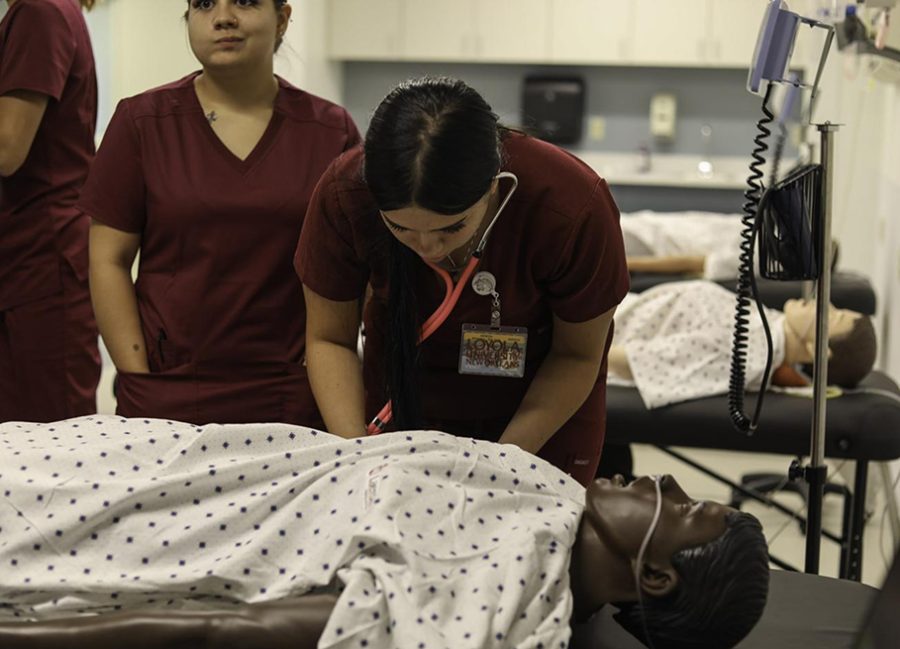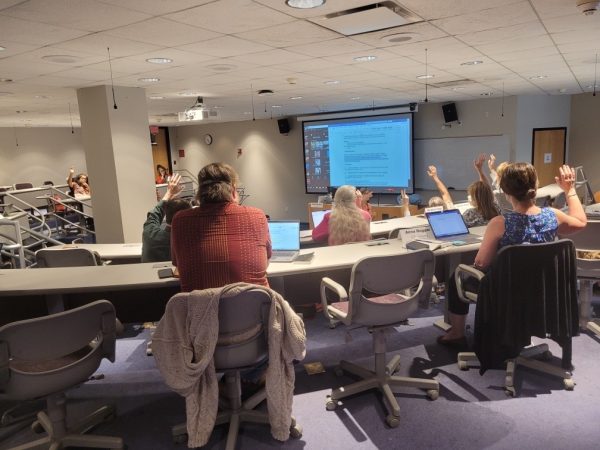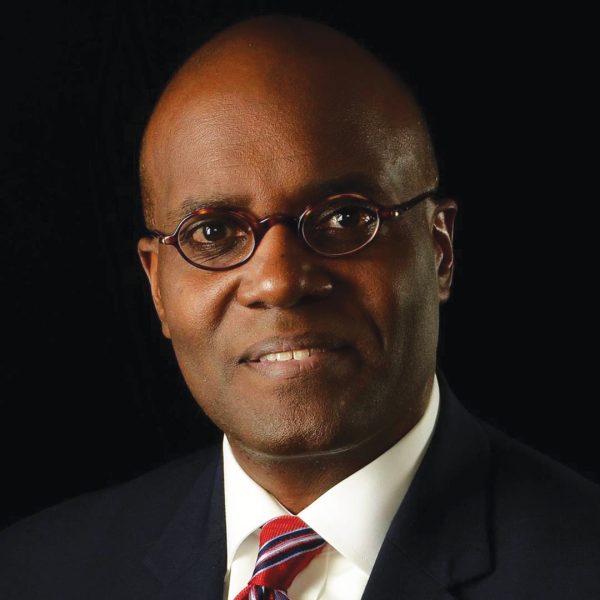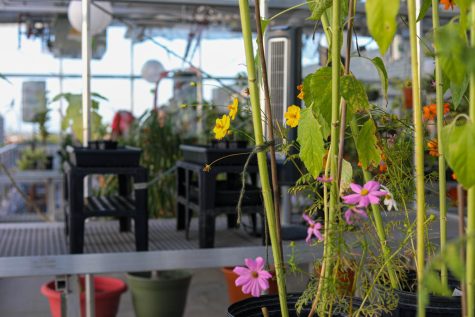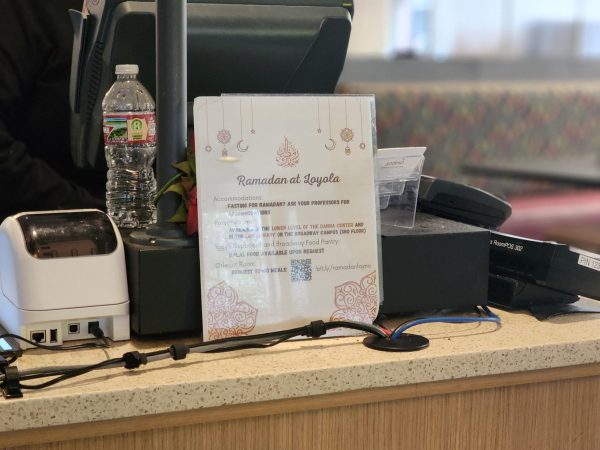Loyola’s nursing school has positive results
Nursing students practice taking vitails on a medical test dummy in Monroe Hall on Aug. 25, 2022.
May 6, 2023
Nestled between Marquette and Bobet Hall and concealed by the West Road Garage, lies Stallings Hall, the home of the College of Nursing and Health. Stallings Hall is easy to miss, but it serves as an important location for Loyola’s nursing students to achieve their academic goals.
From students racing to the finish line of their 17-month accelerated nursing programs to pursuing the country’s second dual program in nurse anesthesia and adult-gerontology acute care, there’s no shortage of work to be done at the School of Nursing.
Dean of the College of Nursing and Health Michelle Collins and Director of the School of Nursing Cherie Burke said the school’s in “growth mode” right now, with hopes to make the Loyola community more aware of all of the opportunities the School of Nursing has to offer.
The traditional route
Loyola began the traditional bachelor in science and nursing in the fall of 2021, but with new additions to the program, like the simulations lab, students are starting to have more opportunities to experience things Collins and Burke say are unique to Loyola.
Nursing junior and member of the Student Nurses Association Kayla Whitfield said that this program has allowed her to stay at Loyola rather than transfer to Louisiana State University Health to finish her nursing degree. She has planned to be a nurse ever since she was little.
“I have gained so much experience and knowledge through this program,” she said. “Before starting nursing school, I couldn’t tell you what it entailed to take care of a patient.”
Whitfield said the program has helped her understand the world of nursing better.
“Healthcare is forever changing, and as nurses and nursing students, we have learned to be flexible with changes,” she said.
Highlighting the importance of hands-on experience, Burke and Collins explained that Loyola offers students the opportunity to work in a hospital during the first semester of their sophomore year, in contrast to other universities that often provide it in the third year.
“Instead of two years of clinical experience, we have three. That extra year will allow not only for more time in a learning environment, but allow for students to gain more confidence,” said nursing first-year and transfer student Christine Bridger.
The School of Nursing partners with Ochsner Health, which Burke said gives the program a leg up with priority for clinical placements, since there are about five nursing schools in the New Orleans area. Clinicals allow student nurses to work with patients while being supervised.
“Clinicals are really the blood of the programs,” Burke said. “You need to get into the hospital.”
What sets the faculty apart?
Not only do students need to be in the hospital, but Burke and Collins also believe that teachers should be practicing as well, which they refer to as the “practitioner teaching model.”
“You’ll be hard-pressed to find a school nursing director and a dean that actually are still working clinically, and we both do,” Collins said.
With healthcare forever changing, as Whitfield said, Burke agreed that for professors to connect with students properly, they must continue to work. Burke said that every faculty member in the program still practices.
“It adds a real, multifaceted layer to our teachings, being able to tell our students those anecdotal stories that we carry with us from practice,” she said. “That’s awesome in the classroom.”
Burke said that as the School of Nursing expands, it is also dedicated to enhancing diversity and inclusion.
“We’ve been very intentional in our hiring,” she said. “We want people teaching our students who look like our students, who understand their culture, and who speak their language.”
Impact and Jesuit values
The School of Nursing is all about making a change, and Bridger said that they are already achieving that by having a diverse group of students.
“Creating programs such as nursing in a culturally diverse area allows for the involvement of more than one subset, which opens the door for more people within the community to feel more welcomed when attempting to access care.”
Freshman nursing major Ivan Parker said he hopes his impact is lifting up the community that often goes unseen.
“It is my goal to expand healthcare to those who are less fortunate than I am,” he said. “I want to be their voice and their advocate because, for far too long, they have been written off and ignored.”
As a first-generation college student, Parker said he wants to make a difference by giving back to the community and presenting himself in a way that shows anyone can make “something out of nothing.”
“New Orleans is a city with a clear economic and healthcare divide,” he said. “We saw during the pandemic that Black people and other underserved minority communities were at more risk to die from a lack of healthcare.”
The new generation of nurses has seen the dire need for the expansion of healthcare amongst minority groups, Parker said.
“Being in the nursing program has shown me things about myself and the world that I never would have imagined,” he said. “Incorporating Jesuit values, specifically those about caring for the poor and oppressed, will help me to become an amazing nurse. It will allow me to put myself in a mind and spirit to be able to see those who aren’t seen in healthcare.”
The college also just started the Student Nursing Association, which is an organization through student government.
Burke said to be on the lookout for the school’s nursing students, as they have things planned in order to integrate them more into the Loyola community.
“Our student nurses really want to help educate their colleagues and classmates, so we have a lot of things planned,” she said.
Tips and tricks
Although the life of a student nurse, or nurse, comes with a huge payoff, students warn that it takes a lot of commitment and willpower to do what they do.
While studying doesn’t dictate a nursing student’s life, it does take up a significant amount of time, according to Bridger.
“Nursing students know the amount of time and effort it takes to be in the program, and therefore they know how much of their time they should be dedicating.”
Parker suggests nursing students should take two to three hours a day to study.
“Passive studying does not work with a major like nursing,” he said. “You must attack the material head first without hesitation.”
Bridger added that students should get comfortable with the idea of being adaptable and know how to self-advocate, as hand-holding isn’t a practice at the School of Nursing.
“Things are constantly changing, and if you aren’t willing to go with the flow, it’s going to be hard out in the world as well as in the program,” she said.
With all of the stress and endurance that it takes to be a nurse aside, Parker said it’s all worth it in the end.
“Sometimes you will cry or feel overwhelmed, and you will have to learn to ask for help for yourself,” Parker said. “But this career and life is rewarding. You can go to sleep knowing that you are putting good into the world.”


